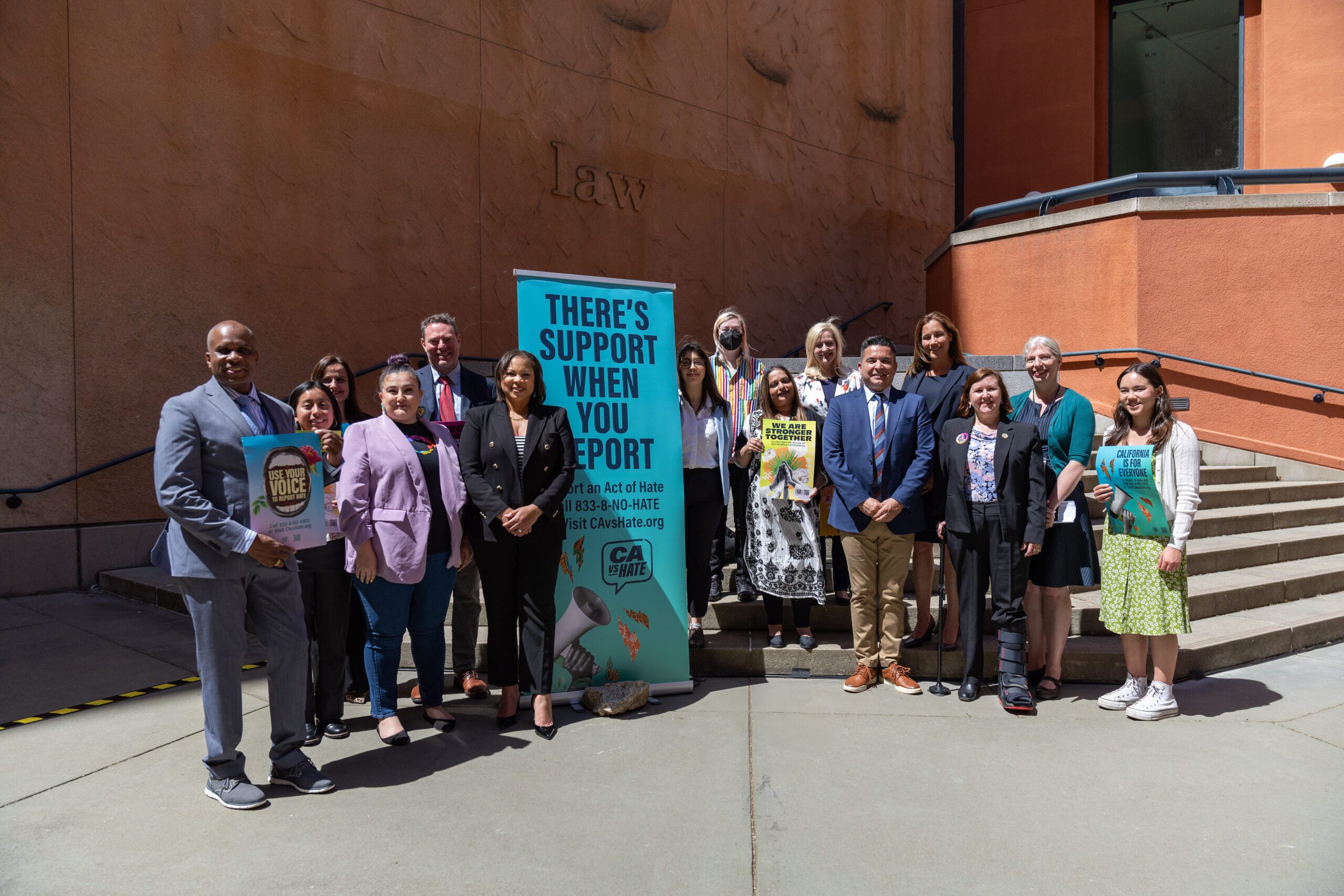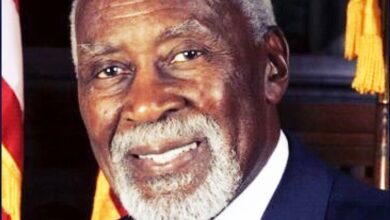
Launches new initiatives to strengthen statewide support network and improve access to resources for all of California’s diverse communities
Releases factsheet compiled by UC Berkeley’s Possibility Lab analyzing CA vs Hate’s first year of data
SACRAMENTO – As part of California’s coordinated response to a nationwide increase in hate, the California Civil Rights Department (CRD), alongside state and community partners, today released new data highlighting the impact of California vs Hate in its first year of operation and announced new and ongoing initiatives to combat hate across the state. Officially launched a year ago this month by Governor Newsom, CA vs Hate is the state’s first-ever multilingual statewide hotline and online portal that provides a safe, anonymous reporting option for victims and witnesses of hate acts. In the first full year of operation, initial data submitted to CRD shows approximately 1,020 acts of hate reported to the hotline.
“CA vs Hate is about recognizing and protecting the incredible diversity of our state and sending a clear message that hate will never be tolerated,” said Governor Gavin Newsom.
“When California was confronted by an alarming increase in hate, we didn’t just sit back and hope it got better,” said CRD Director Kevin Kish. “We came together and launched an array of nation-leading programs to ensure all our communities feel welcome and protected. I’m incredibly proud of our state’s resilience and commitment to a California for all. This work is only just beginning, but it would not be possible without the advocacy of our community partners and the foresight of our state’s Administration and Legislature. With CA vs Hate, we’re doing our part to ensure that when people report they get support.”
Many hate crimes have historically gone unreported due to a variety of factors, including fear of retaliation, lack of culturally competent resources, concern around potential immigration consequences, and distrust of law enforcement. CA vs Hate aims to help address some of these issues by offering people targeted for hate — and their communities — additional resources to report acts of hate through a community-centered approach that does not require engagement with the criminal legal system. Hotline services are confidential and provided for free, regardless of immigration status. CA vs Hate accepts all reports of hate and is not limited to only receiving reports that are criminal in nature. Whether individuals report to CA vs Hate online or by phone, they are eligible to receive ongoing care coordination to ensure people impacted by hate are able to access resources and support, including legal, financial, mental health, and mediation services.
As part of the effort to make CA vs Hate as inclusive and easy-to-use as possible, individuals who report an act of hate can remain anonymous and, recognizing that hate can target multiple aspects of a person’s identity, may select multiple bias motivations related to the report. To the extent that individuals who report are comfortable doing so, CA vs Hate staff engage extensively with them through initial contacts over the phone or follow up care coordination to better understand the incident and services needed. More granular data verified through that process is also included below. While CA vs Hate data serves as an important indicator, the hotline is new, and the data should not be treated as being representative of all acts of hate in California. In all, people who reported to CA vs Hate were directed to more than 100 different forms of resources and support. In the first full year of operation, CA vs Hate:
- Had 2,118 contacts from members of the public seeking assistance — including non-hate related reports — and directed people to resources, regardless of whether a report was tied to an act of hate. Of those contacts:
- The most common reasons cited for the reports were discriminatory treatment (18.4%), verbal harassment (16.7%), and derogatory names or slurs (16.7%).
- The most common location types for where an incident occurred were residential (29.9%), workplace (9.7%), and public facilities (9.1%).
- Received 1,020 actual reports of hate based on the information provided by the individual reporting the act. Of those reports:
- Roughly four out of six people agreed to follow up for care coordination services, including direct and ongoing support accessing legal aid or counseling.
- Nearly 80% of California’s counties were represented, including all 10 of the state’s most populated counties.
- Further validated bias motivation information for 560 reports through additional CA vs Hate staff review. Of those reports:
- Race and ethnicity (35.1%), gender identity (15.1%), and sexual orientation (10.8%) were the most cited bias motivations.
- Anti-Black (26.8%), anti-Latino (15.4%), and anti-Asian (14.3%) bias were the most cited reasons for reports related to race and ethnicity.
As reported hate crimes have risen in recent years, California has led the charge in responding through increased grant funding, innovative programs, and expansive outreach efforts across state government and in collaboration with community-based organizations. These partnerships — whether through the Stop the Hate Program or Ethnic Media Outreach Grants — are critical to CA vs Hate’s success. As CA vs Hate continues to grow, the program is launching new initiatives and building on existing efforts aimed at strengthening the hotline’s statewide support network and improving access to resources for all of California’s diverse communities. These ongoing or upcoming efforts include:
Outreach Campaigns
- Kicking off CA vs Hate’s first-ever billboard campaign to support increased awareness of the hotline and available resources across half a dozen cities.
- Launching targeted outreach materials to support increased access to CA vs Hate resources for historically hard-to-reach and underserved Californians, including new digital assets developed in coordination with tribal partners and members of the AAPI community.
- Developing new pathways to reach members of the public, including through a digital ad partnership with the California Department of Motor Vehicles and in-person event engagement with California-based sports teams.
Capacity Building
- Launching a partnership with UC Berkeley’s Possibility Lab to support increased data collection and analysis going forward.
- Exploring the launch of a text-responsive reporting option to support increased access to the CA vs Hate hotline.
- Stepping up statewide coordination efforts through ongoing collaboration with United Against Hate Week.
Community Engagement
- Bolstering community-specific engagement through the Jabara-Heyer NO HATE Act grant to ensure communities most targeted for hate have access to resources, including a new partnership with California Black Media.
- Establishing new quarterly meetings with city and county government partners to support increased responsiveness to local communities and build on existing feedback mechanisms in place for community-based organizations.
- Standing up a coalition of faith-based leaders from a range of backgrounds to better address acts of hate targeting Californians on the basis of religion.
CA vs Hate is a non-emergency, multilingual hate crime and incident reporting hotline and online portal. Reports can be made anonymously by calling (833) 866-4283, or 833-8-NO-HATE, Monday to Friday from 9 a.m. to 6 p.m. PT or online at any time. Hate acts can be reported in 15 different languages through the online portal and in over 200 languages when calling the hotline. For individuals who want to report a hate crime to law enforcement immediately or who are in imminent danger, please call 911. For more information on CA vs Hate, please visit CAvsHate.org.
This resource was supported in whole or in part by funding provided by the State of California, administered by the California State Library via California Black Media as part of the Stop the Hate Program. The program is supported by partnership with California Department of Social Services and the California Commission on Asian and Pacific Islander American Affairs as part of the Stop the Hate program. To report a hate incident or hate crime and get support, go to CA vs Hate.




